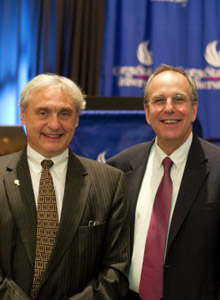Kozinski Says Show, Don't Tell
ATLANTA − While intellectual property used to be a legal niche, Alex Kozinski, chief judge of the U.S. Court of Appeals for the 9th Circuit, says with the rise of new technology it has become the bread and butter of many law firms.
 Kozinski, one of the foremost jurists and legal thinkers in the country, delivered the 51st Henry J. Miller Distinguished Lecture on Nov. 1 at Georgia State University College of Law. He focused his talk on intellectual property cases, which arise frequently in the circuit because of its California location, close to the entertainment and technology hubs of Los Angeles and Silicon Valley.
Kozinski, one of the foremost jurists and legal thinkers in the country, delivered the 51st Henry J. Miller Distinguished Lecture on Nov. 1 at Georgia State University College of Law. He focused his talk on intellectual property cases, which arise frequently in the circuit because of its California location, close to the entertainment and technology hubs of Los Angeles and Silicon Valley.
"IP cases touch people in a way that other cases simply don't," Kozinski said, noting how much attention cases involving toy giant Mattel and Facebook, among others, have garnered in the media and among the general public.
Particularly in the intangible realm of intellectual property, the most effective arguments are supported by concrete examples, Kozinski said. Words are abstractions, he noted, so simplifying and building an argument using images and sounds or by analogy to existing technology will better hold judicial attention: Concrete examples can persuade in a way that abstract legal examples do not.
"Lawyers are far too reluctant to depart from words and the occasional diagram," Kozinski said.
In keeping with his advice, Kozinski used visuals, sound and video clips throughout his presentation as he discussed past cases.
During a question and answer session after the lecture, Kozinski emphasized that oral argument can make a difference if it engages the judges, but there is a fine line — every word can be a pitfall. Most cases are actually lost in oral argument, he said: "Sometimes you win by saying nothing."
The Henry J. Miller Distinguished Lecture Series is supported by the Charles Loridans Foundation and named for the late Henry J. Miller, a partner at Alston & Bird for more than 50 years.
Kathleen Poe Ross
404-413-1374